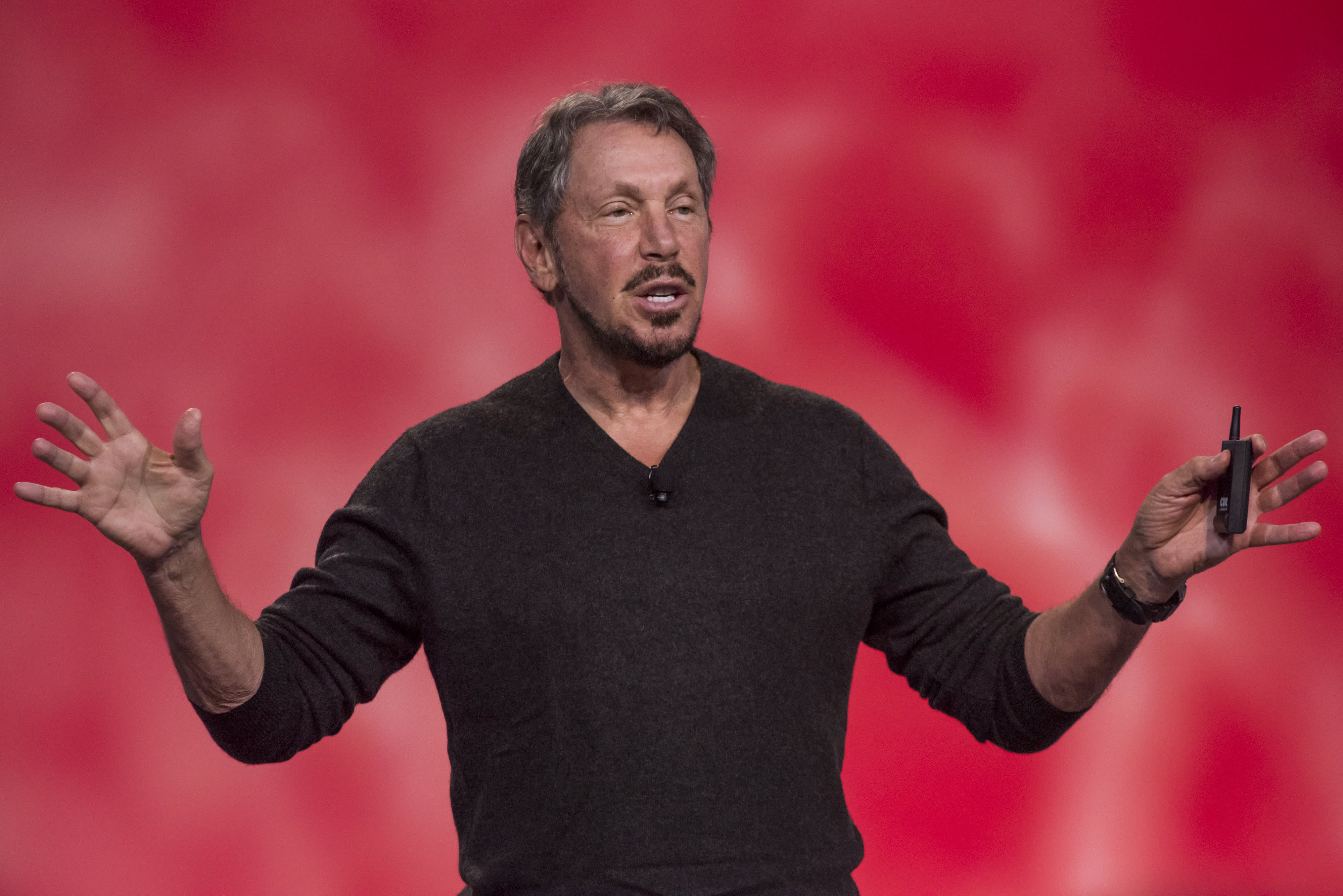Oracle remains distant laggard in cloud infrastructure market even after TikTok deal

Larry Ellison, chairman of Oracle Corp., speaks during the Oracle OpenWorld conference in San Francisco on Oct. 25, 2015.
David Paul Morris | Bloomberg | Getty Images
Picture cloud infrastructure as a city with many office buildings. Amazon is the landlord everyone talks about, because of its sleek towers, fast elevators, modern floor plans and high-energy tenants.
Oracle, by contrast, houses law offices and financial advisory firms that serve burnt coffee in the kitchen.
Oracle has been trying for years to burnish its image in the cloud infrastructure market, taking on Amazon Web Services, Microsoft Azure and Google Cloud Platform with services that give customers more tools to store and manage their data remotely. It talks up its artificial intelligence and “self-driving databases” to show that it’s not the boring old vendor selling the digital equivalent of plastic cubicles.
For Oracle, winning a customer like popular video creation app TikTok is understandably a cause for celebration. Co-founder Larry Ellison proclaimed in a statement over the weekend that Oracle’s “new generation Cloud2 infrastructure” was chosen “because it’s much faster, more reliable and more secure than the first generation technology currently offered by all the other major cloud providers.”
The announcement comes less than five months after Oracle picked up a slice of business from Zoom, which was looking to diversify its spending off AWS as usage surged during the coronavirus pandemic.
Yet, Oracle remains a “niche player” in the market, according to Gartner, well behind the leaders. Oracle’s market share sits at around 2%, based on data from Gartner, Synergy Research Group and Canalys, and ranks no higher than sixth globally.
Analysts at RBC don’t expect Oracle’s cloud revenue to top $1 billion until fiscal 2023. AWS generated almost $21 billion in sales in the first half of 2020.
In upgrading Oracle’s stock to an equivalent of a buy on Sunday, RBC analysts described the TikTok deal as a “shot in the arm” and one that could “accelerate growth in a segment that is important for the future of Oracle.” Wedbush analysts wrote that the agreement “could have positive financial ripple impacts.”
Oracle needs the growth. The company, which still gets the bulk of its revenue from traditional database software and related services, only increased sales 2% in the last quarter after shrinking the prior period.
Its stock is up 13% in the past year, trailing all its major cloud competitors. Amazon shares have gained more than 60% and Microsoft is up over 40%.
Oracle vs. cloud rivals
CNBC
Talk to companies most reliant on the public cloud and Oracle’s name often doesn’t even come up.
Snowflake, which went public last week in the biggest software IPO ever, introduced its cloud-based data warehouse software for storing and analyzing data in 2014 exclusively on AWS. It added Azure in 2018 and Google earlier this year. Snowflake said in its prospectus that it’s committed to spending $1.2 billion over five years on AWS.
Snowflake’s service isn’t available on Oracle, even though two of Snowflake’s three founders worked there for over a decade. They started Snowflake in 2012, six years after AWS launched and three years before Oracle announced its Elastic Compute Cloud.
‘What the hell is cloud computing?’
Ellison spent the early days of AWS criticizing cloud computing, suggesting it was a new name for existing technologies.
“I mean, what the hell is cloud computing?” Ellison said in a meeting with analysts in 2008. “I don’t understand what we would do differently in the light of cloud computing other than change the wording on some of our ads.”
The debate is over. All of the growth in infrastructure and databases is in the cloud, and Oracle is in a battle to stay relevant.
“Oracle has been really busy in the last year adding functionality,” said Raj Bala, an analyst at Gartner who focuses on cloud infrastructure. The company added cloud capacity around the world and bolstered its infrastructure, he said.
“The big question with Oracle ultimately is: will they be viewed as a general purpose service? In today’s market the answer is still largely no,” Bala said. He called TikTok a “big logo to add to the list” but said there’s no guarantee that it will lure other big companies.
In a statement to CNBC, Clay Magouryk, executive vice president of Oracle Cloud Infrastructure, reiterated Ellison’s claim that TikTok picked Oracle “because it’s much faster, more reliable and more secure” than other vendors. He also cited a survey from IDC in which Oracle “received the highest satisfaction score” among cloud providers.
One problem with the deal is that it’s fraught with politics. The only reason it happened was because President Trump said he would ban TikTok, which is owned by China’s ByteDance, unless control was transferred to a U.S. company or conglomerate. Ellison is a Trump supporter and donor, a relationship that many analysts say allowed Oracle to help shape the transaction.
With the deal, Oracle is taking a 12.5% stake in TikTok and will run its cloud security and services. Oracle will move TikTok to its cloud from the app’s current providers, which include Alibaba and Google, CNBC reported on Monday.
“In terms of Oracle’s credibility and stance in the market, it is tough to argue that this would be a big boost,” said John Dinsdale, an analyst at Synergy, an an email. “After all, it is the result of political shenanigans and not a competitive process whereby Oracle’s cloud capabilities were weighed up against its competitors.”
— CNBC’s Ari Levy contributed to this report.
WATCH: Oracle’s TikTok opportunity may be ‘generational,’ says RBC Capital Markets’ Alex Zukin